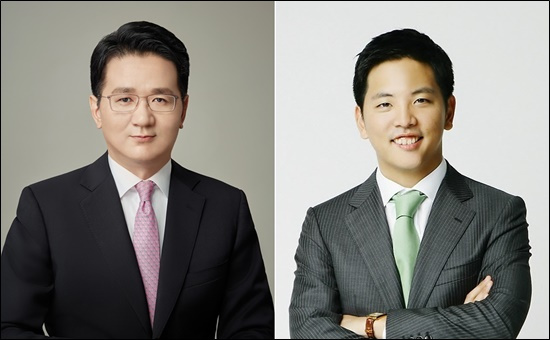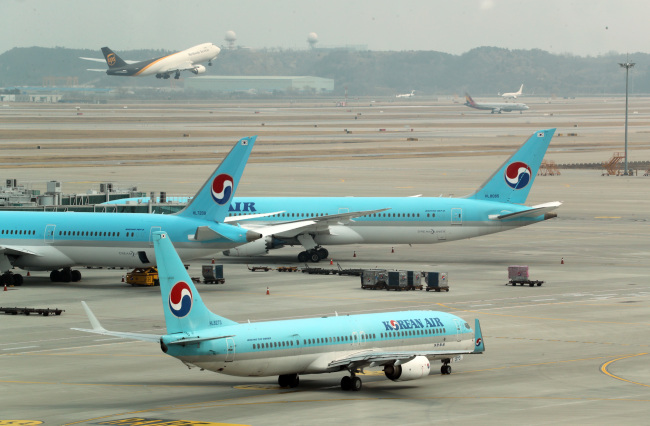With their fathers stepping down from the top management seats, heirs to the nation’s two major air carriers appear to be readying to fill the vacuum amid market concerns over their lack of experience and untested leadership.
Unlike other conglomerates that have spent years preparing their heirs to take the top spot, the third-generation chaebol scions at Korean Air and Kumho Asiana Group, the parent company of Asiana Airlines, both seemingly unprepared, are being pushed to take the baton from their fathers who both resigned in disgrace last week.
The sudden departure of the two chairmen is expected to open a new era in the nation’s aviation market where the two groups built intense rivalry over the years. But questions remain over whether they can prove their capabilities as new leaders, particularly at a critical time when both are facing unprecedented management risks, market distrust and growing anti-chaebol sentiment.
 |
Korean Air President Cho Won-tae (left) and Asiana IDT President Park Se-chang |
Cho Won-tae, president of Korean Air, spent only three years at the air carrier, assisting his father Chairman Cho Yang-ho and other executives who spent more than 30 years in the commercial aviation industry. The chairman lost his board seat after the National Pension Service’s campaign that held him responsible for infringing investors’ rights. The chairman’s 43-year-old son is a board member of Korean Air.
But the younger Cho might have to prove his leadership and capability as a responsible CEO within a short period of time -- in two years before his board membership expires in March 2021, and is put up for vote. In the meantime, Won-tae is likely to lead the nation’s flagship carrier along with Vice President Woo Ki-hong in a dual-CEO system, according to insiders.
 |
(Yonhap) |
The heir is one of the chairman’s three children. His sisters -- Cho Hyun-ah and Cho Hyun-min -- both stepped down from their executive posts over two separate power abuse and violence scandals that instigated public anger toward the chaebol family. Won-tae joined the family business in 2003, taking a junior post at a Hanjin affiliate, and has remained under the shadow of his father since then.
On Asiana’s front, it appears it will take some time for Park Se-chang, the eldest son of the chairman to take the leadership of the conglomerate as well. While resigning from CEO positions at Asiana, Kumho Industrial and Kumho Buslines, Chairman Park Sam-koo said the group will appoint an outsider to the top executive post. Observers say having an interim leader would buy some time for the group to escape from its severe liquidity crisis first and to transfer power from the father to son.
Kumho Asiana Group currently faces a cash crunch due mainly to losses suffered by South Korea’s second-biggest air carrier, which accounts for more than 60 percent of its entire sales and has debt more than six times its equity. The impact of Asiana’ losses is rippling through other affiliates -- Kumho Industrial, Kumho Buslines and Asiana IDT -- due to a complex governance structure.
 |
(Yonhap) |
State-run Korea Development Bank has told it to come up with tougher self-rescue plans, after the chairman resigned in an apparent move to ask the main creditor for an extended support. On Monday, Asiana CEO Han Chang-soo said that the company will sell more assets, suspend nonprofitable routes and conduct an organizational reshuffle. The two sides are set to meet on Saturday to renew a memorandum of understanding signed last year.
Asiana signed an MOU with the state lender in April last year to improve its financial status, vowing to secure liquidity by selling the group’s headquarters building and noncore assets, as well as issuing convertible bonds.
Se-chang is the president of Asiana’s IT service affiliate and has no experience at its air carrier which appears to be his biggest weakness, although he holds a 21 percent stake in Kumho Busline -- holding company of the group. The 43-year-old heir has spent most of his career at the group’s tire making unit, Kumho Tire, which is now owned by China’s Qingdao Doublestar after suffering from years of liquidity crisis. He was a vice president at Kumho Tire’s strategic plan division, before he was transferred to Kumho Asiana Group as the head of strategy office in 2016.
Some market protagonists say that the tradition of chaebol transferring power to descendants might face unexpected hurdles from shareholders’ rights activists, unionized workers and the NPS, which has been under increasing pressure to exercise its voting rights to keep the management in check.
But the succession of power for Korean Air and Kumho Asiana heirs is going to happen anyway, said Park Ju-gun, founder of CEO Score, a local corporate tracker, citing the controlling shares held by the owner families.
“For Asiana, it might take 4-5 years to resolve financial risks and conduct governance restructuring which might include a market debut of Kumho Industrial to raise cash and transfer a part of the chairman’s shares to his son, enough to defend the management rights,” he said. The family holds a combined 67 percent stake in Kumho Buslines, which controls Asiana Airline via its 45 percent shares in Kumho Industrial.
Korean Air, for its part, might also have to figure out how to transfer the chairman’s shares of Hanjin Group, the parent company of the air carrier, to his son. The Cho family currently holds a 33.3 percent stake in Korean Air, and a 29 percent stake in Hanjin KAL.
“Unless the Cho family puts their Hanjin Group shares on sale, there’s no way to keep them out of the management,” he said.
By Cho Chung-un (
christory@heraldcorp.com)









![[Today’s K-pop] Blackpink’s Jennie, Lisa invited to Coachella as solo acts](http://res.heraldm.com/phpwas/restmb_idxmake.php?idx=644&simg=/content/image/2024/11/21/20241121050099_0.jpg)
